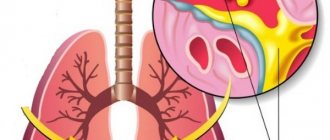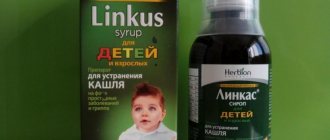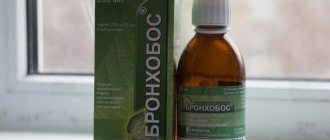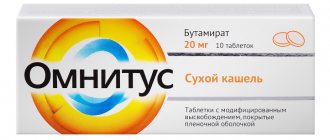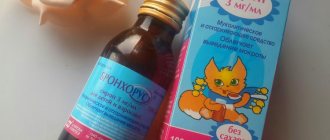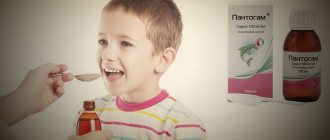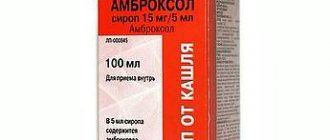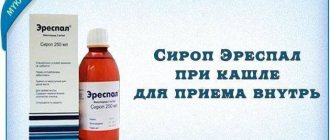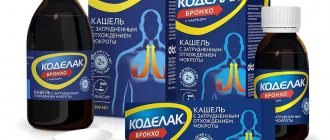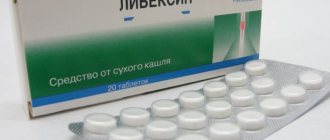It's no secret that children often get sick. This is especially true for children who have gone to kindergarten or school, which are not only a storehouse of knowledge, but also a breeding ground for bacilli. Very often, any respiratory sores, even if not too “serious,” are accompanied by a dry, hacking cough, which is unpleasant for the baby and unnerving for vigilant parents.
The question immediately arises of choosing an antitussive drug that can solve the problem. At the same time, taking into account the target audience, it is important that such a product is as effective as possible, but at the same time safe. It won't hurt if it doesn't cost exorbitant amounts of money. The domestic product made from licorice glabra meets all these criteria.
So, what kind of plant is this, and why are drugs based on it so effective? How to give licorice syrup to children for cough, when is it justified, and when can it cause harm rather than benefit? What do other parents think about this medicine? Now we will find out everything about this medicine.
Release form and composition
The dosage form of the drug is syrup: a thick brown liquid with a specific odor (50 and 100 g in orange glass bottles or polyethylene terephthalate bottles, each bottle is packed in a cardboard box).
Composition of 100 g syrup:
- active substance: thick licorice extract – 4 g, including glycyrrhizic acid – at least 14%;
- auxiliary components: sugar syrup – 55.04 g, purified water – 31.69 g, ethanol (ethyl alcohol) 95% – 9.27 g.
Alternative cough remedies
If taking syrup is not entirely convenient, licorice is also used to make lollipops, lozenges and cough tablets for children. But if you are not satisfied not so much with the release form as with the main ingredient, it makes sense to choose a worthy alternative:
- Pertussin for children is one of the most popular cough remedies, but before taking even such a time-tested medicine, it is better to read the instructions for its use.
- Prospan does not contain alcohol or sugar, so it is absolutely safe even for newborn patients.
- Marshmallow syrup is also prescribed for children in cases of dry cough, based on the instructions for use, it copes with it no worse than licorice.
- Stodal is not considered a medicine, it is rather classified as a homeopathic remedy, but that makes it no less effective.
- Travesil is also made from plant components.
- Herbion has several types of drugs in its line; a remedy based on plantain will help with cough.
- Stoptussin-phyto is also made on the basis of plantain with the addition of thyme extract.
You need to choose an alternative wisely, primarily based on the needs of your baby. Therefore, it is better not to make such a choice without a doctor; only he will recommend a drug that will adequately replace licorice root syrup for the child.
Contraindications
- bronchial asthma;
- fructose intolerance, sucrase/isomaltase deficiency, glucose-galactose malabsorption;
- peptic ulcer of the stomach and duodenum during an exacerbation;
- gastritis;
- period of pregnancy and breastfeeding;
- the presence of hypersensitivity to the components of the drug.
Licorice cough syrup should be used with caution in case of brain diseases, traumatic brain injuries, liver diseases, alcoholism, diabetes, and also in childhood.
Overdose
In cases of incorrect use of syrup, cases of overdose are possible. This condition manifests itself:
- nausea;
- allergic skin rashes;
- disorders in the gastrointestinal tract.
At the slightest sign of this condition, it is important to consult a doctor and adjust the dosage, frequency of administration and course duration. In addition, signs of overdose may appear if you use other drugs that are not compatible with licorice root syrup.
Instructions for use of Licorice syrup: method and dosage
The syrup is taken orally, after diluting it in water.
Recommended dosage regimens:
- adults and children over 12 years old: 1 teaspoon diluted in 1/2 glass of water, 3 times a day;
- children 6–12 years old: 50 drops diluted in 1/2 glass of water, 3 times a day;
- children 2–6 years old: 2–10 drops diluted in 1 teaspoon of water, 3 times a day;
- children under 2 years old: 1-2 drops diluted in 1 teaspoon of water, 3 times a day.
The duration of therapy is 7–10 days. The need for a repeat course is determined by the doctor individually.
To facilitate expectoration, especially in patients with difficult sputum production, plenty of warm fluids are recommended during treatment.
Use for cleansing the lymphatic system
According to adherents of traditional medicine, cleaning the lymphatic system with licorice syrup is extremely useful for promoting health and preserving youth for many years.
Lymphatic fluid circulating in the human body carries various substances (proteins, water, lymphocytes, toxins, etc.) from tissues to the blood.
With poor nutrition and an inactive lifestyle, harmful human waste products accumulate in the lymph, “contaminating” it and complicating the functioning of the entire lymphatic system, thereby worsening well-being and contributing to the development of various diseases.
Traditional healers and some doctors recommend taking licorice syrup for lymph, its cleansing and healing in a two-week course. The classic way to use licorice syrup during this period includes the following: every morning on an empty stomach, drink one tablespoon of the drug, diluted with a glass of water.
Licorice removes harmful substances into the intestines. To prevent them from getting back into the blood, during the cleansing course, any sorbent drug is taken daily, which binds toxic substances and removes them from the body.
For example, Enterosgel is suitable as a sorbent, a tablespoon of which is drunk about an hour after taking the medicine.
Licorice syrup and Enterosgel can benefit the body, but you should definitely consult your doctor about their use and the need for a cleansing procedure.
It is strictly forbidden to use licorice syrup to cleanse the lymphatic fluid during pregnancy and the lactation period, with diabetes of both types, acute stages of diseases of the digestive system, hypertension, or the presence of an allergic reaction to the components of the drug.
special instructions
Patients with diabetes should take into account the carbohydrate content in the drug: in 1 drop – 0.0024 XE, in 1 spoon – 0.29 XE.
Licorice syrup contains ethanol: in the maximum single and daily dose for adults - 0.54 g and 1.62 g of absolute alcohol, respectively. 1 drop (dose for children) contains 0.0046 g of absolute alcohol.
Impact on the ability to drive vehicles and complex mechanisms
During the entire period of treatment, it is recommended to exercise caution when engaging in potentially hazardous activities that require quick reactions and increased attention.
Interaction with other drugs
Due to the risk of developing high potassium levels in the blood, syrup should not be used in conjunction with diuretics (diuretics) of the thiazide group. In addition, if the blood potassium level is low, simultaneous administration of cardiac glycosides may have a toxic effect. Also, if you take glucocorticosteroid drugs in parallel with licorice syrup, the decay period of their main component (cortisol) increases.
Considering the mechanism of action of the drug, it should never be taken in combination with other antitussive drugs . The active ingredients of the syrup dilute mucus in the bronchi, which is expelled with a cough. If the cough is removed, the pathological mucus will settle in the alveoli, and in this case, pneumonia is not far away.
Reviews of Licorice syrup
According to reviews, Licorice syrup is a cheap but effective expectorant that helps with coughs accompanied by difficult-to-clear phlegm. Its additional advantages include its natural origin, a small list of contraindications, and the ability to use it to treat children.
The disadvantage, according to many, is the presence of a large amount of sugar and ethanol in the composition.
The syrup has a sickly sweet aftertaste, which some patients find pleasant, while others find it unpleasant.
Operating principle
Due to its composition, licorice root syrup has several effects on the body:
- dilutes mucus and promotes its rapid removal from the lungs;
- relieves the inflammatory reaction from the thin walls of the bronchi;
- stimulates the body's nonspecific defenses;
- promotes rapid restoration of areas of the bronchi and alveoli affected by pathogenic microflora;
- expands the bronchi, relieving the spasm that blocks the removal of excess mucus;
- reduces the viability of viruses, helping the body “finish off” enemy agents.
In addition, the main active ingredient has a direct inhibitory effect on microorganisms such as staphylococci, mycobacteria and other bacilli. As a result, we have a simple but effective mechanism for how the syrup works:
- pathogenic microflora is destroyed;
- the bronchi expand, inflammation is relieved;
- mucus is separated from the walls of the bronchi and coughed out;
- Over time, the cough goes away as the lungs have cleared and it is no longer necessary.
Tinctures
You can prepare a healing remedy at home. To do this you need to follow a few simple steps:
- Finely chop the root of the plant and fill it with water in a ratio of 1:5.
- The resulting product should be infused for 14 days in a dark place.
- The infusion must be filtered.
To combat cough, the medicine is taken twice a day, 35 drops. The tincture is washed down with warm water. At the pharmacy you can buy a ready-made mixture in small bags. For 200 ml of boiling water you need to take 3 such packets. The product is infused for half an hour.
The final duration of treatment is always adjusted by the attending physician, since everything depends on the severity of the disease. The drug in any form can be used for no more than two weeks. If you take licorice root for a long time, this is fraught with a significant increase in blood pressure, swelling of the limbs and a decrease in libido.
Effect on the body
The use of syrup stimulates secretory and motor stimulation of the functions of the respiratory system. The drug helps get rid of phlegm and wet cough. The elements contained in the product thin out mucus and relieve spasms from the bronchial muscles. In addition to the expectorant effect, syrup:
- Restores the body's strength;
- Heals mucous membranes;
- Reduces the concentration of cholesterol in the blood;
- Gives a laxative effect;
- Has antitumor and antiviral effects.
Licorice also acts as an excellent antiseptic.
Licorice syrup has many positive properties:
- It is convenient to dose the drug; it comes with a measuring cup or spoon;
- The product is sold in many pharmacies and is inexpensive;
- The substance is thick, it quickly envelops the mucous membrane;
- The product does not need to be infused or boiled, just dissolve it in water according to the instructions;
- The taste of the syrup is pleasant;
- The product contains only natural ingredients, so it is suitable for children.
There are few contraindications for taking the drug by children. The effect of the syrup is universal. The product not only eliminates the symptoms of diseases, but also has an effect on viruses and bacteria.
There are also virtually no restrictions on the use of licorice. The drug perfectly relieves the manifestations of dry and paroxysmal cough. In addition, its use shortens the course of the disease and prevents complications.
Adverse reactions
Before you begin treating diseases of the upper respiratory tract with licorice root, you need to familiarize yourself with all the possible negative manifestations that this medication can cause:
- Acute pain in the joints.
- Dizziness and fainting.
- Allergic manifestations (burning of the skin, itching, red rashes).
- Liver dysfunction.
- Stool disorders.
- Depression.
- Gynecological bleeding.
If we take into account all the restrictions and adverse reactions, then the treatment of dry cough with licorice must be approached as carefully and responsibly as possible. You should first consult with your doctor to avoid worsening the condition.
How the medicine works
Licorice syrup contains a large number of beneficial microelements. In the fight against dry, unproductive cough, a special place is given to glycyrrhizin. This component has the following properties:
- antiviral (the reproduction and spread of infectious agents is suppressed);
- immunostimulating (strengthening and supporting the protective properties of the child’s body);
- relaxing (the drug relieves bronchospasm, increasing the respiratory lumen);
- expectorant (thinning mucus and facilitating the removal of phlegm from the lungs);
- anti-inflammatory (if you take the product according to the instructions, you can reduce body temperature and other symptoms of the disease).
It should also be noted that the medicine can prevent the appearance of tumors and edema, activate natural tissue regeneration, accelerating rehabilitation after illness.
